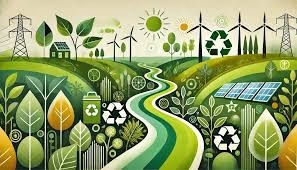The world is undergoing a profound shift towards sustainability, driven by the urgency of climate change, resource depletion, and environmental degradation. In this transition, “green jobs” have emerged as a fast-growing sector, creating opportunities for students to build careers that align economic growth with environmental responsibility.
International frameworks such as the 2015 Paris Agreement and the United Nations’ Sustainable Development Goals (SDGs) have set ambitious targets, prompting governments, businesses, and organisations to invest heavily in sustainable practices and green technologies. As a result, industries worldwide are opening up diverse pathways for environmentally conscious employment.

What are green jobs?
Green jobs directly or indirectly contribute to sustainability by encouraging eco-friendly practices, renewable energy adoption, and resource conservation. Beyond protecting the environment, these roles are central to shaping a sustainable economic future.
In-demand green career options
Experts highlight a wide range of emerging opportunities for students:
- Energy Auditors: Evaluate energy usage in buildings and industries, recommend eco-friendly alternatives, and help businesses cut emissions.
- Renewable Energy Technicians: Specialise in solar, wind, and hydroelectric systems, driving the clean energy transition.
- Environmental Engineers: Design processes to manage waste, water, and pollution while developing sustainable infrastructure.
- Ecologists: Study ecosystems, guide conservation policies, and advise on biodiversity and land management.
- Green Entrepreneurs: Innovate eco-friendly products, sustainable agriculture solutions, and waste management startups.
- Environmental Consultants: Advise companies on reducing environmental impact while ensuring compliance with regulations.
- Climate-Tech Specialists: Develop technologies such as carbon capture, air quality monitoring, and climate adaptation tools.
- Sustainable Agriculture Experts: Promote organic farming, vertical farming, hydroponics, and urban food security solutions.
- Waste Management Professionals: Create awareness and solutions for plastic disposal, recycling, and resource efficiency.
Education and training

To prepare for these roles, students can pursue degrees in environmental science, engineering, climatology, agriculture, or food sustainability, complemented by short courses and certifications in renewable energy, sustainable business, and climate studies. Indian institutions such as the IITs and the TERI School of Advanced Studies offer specialised programs.
Global certifications like LEED (Leadership in Energy and Environmental Design) and ISO 14001 (Environmental Management Systems) are also highly valued by employers. Additionally, targeted training in energy efficiency, carbon footprint reduction, and sustainable agriculture strengthens employability in the green sector.
The bigger picture
As industries transform, green jobs are not just career opportunities, they are crucial to securing a sustainable future. For students, they offer the chance to combine purpose with profession, contributing to solutions that will shape the planet for generations to come.




